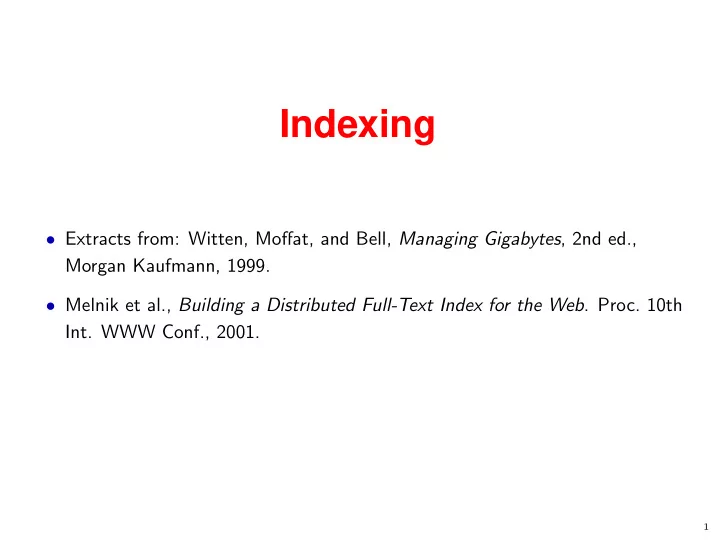

Indexing • Extracts from: Witten, Moffat, and Bell, Managing Gigabytes , 2nd ed., Morgan Kaufmann, 1999. • Melnik et al., Building a Distributed Full-Text Index for the Web . Proc. 10th Int. WWW Conf., 2001. 1
Indexing Documents Basic task: Process document collection so docs containing a query word can be retrieved fast. Input: document collection. Output: search structure for collection. 2
Standard Solution Inverted file + lexicon • Inverted file = for each word w , list of docs containing w . • Lexicon = dictionary over all words occuring in doc collection (key = word, value = pointer to inverted file + additional info for word, e.g. length of inverted list). 3
Lexicon • Sorted list of occuring words + binary search. How to store variable length strings? – Array of pointes into concatenated strings. – Do. + blocking – Do. + blocking + front coding (prefix compression). • Hash tables. • Tries, ternary search trees, suffix arrays (later) • External: blocking + lexicon over first string in each block. Repeat ⇒ prefix B-tree. 4
Inverted File Simple (one occurence per doc): w 1 : DocID, DocID, DocID w 2 : DocID, DocID w 3 : DocID, DocID, DocID, DocID, DocID, DocID. . . Detailed (all occurences in docs): w 1 : DocID, Position, Position, DocID, Position. . . Even more detailed: Position annotated with info (heading, boldface, anchor text,. . . ). Useful for ranking. 5
Compressing the inverted file • “Hand coding” – Store diffs between DocIDs, not absolute DocIDs – Code this diff efficiently (unary, γ , δ , Bernoulli (global or local),...). • Use generic compression tools (gzip,. . . ) • Compress each entire inverted list • Block the list file, compress each block. 6
Combine inverted list and lexicon Melnik et al.: • Use standard (embedded) DB library (e.g. Berkeley DB). • Sample entries in inverted file evenly (such that parts between samples can be coded in a page size). Use DB with (key,value) = (sample, next coded part). Generic compression can be applied to parts too. 7
Preprocessing • Find words – Remove mark-up, scripts,. . . – Coding scheme? Unicode, latin-1, ascii? – Lowercase – Definition of word? (suggestion: alphanumeric sequence, max 4 digits, max 256 chars). • Stemming? (don’t). • Stop words? (probably don’t - store all words, and allow stop words at query time). 8
Building the index • Hashing only good within RAM. Normally not relevant for web. • I/O-efficient sorting: OK. Distribution • Split on DocID (“local inverted files”). • Split on WordID (“global inverted files”). Split on DocID is probably better since for AND-queries, filtering of lists can be done at each machine (less communication). Melnik et al. give further considerations on efficient distributed building. Among other things: interleave CPU, disk I/O, and net traffic (idea of interleaving CPU time and I/O is also useful for external sorting). 9
Recommend
More recommend